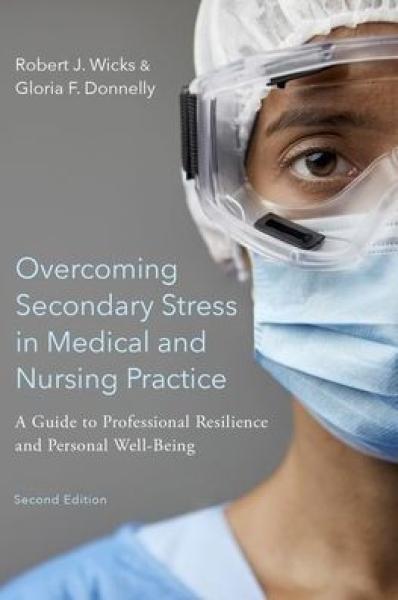Description
Medical and nursing professionals working in today's health care settings must be prepared to offer support in dangerous times despite staffing shortages, financial pressures, and complex legal requirements. The nature of this work puts these professionals in harm's way not only physically, but at greater risk for secondary stress, trauma, burnout and other emotional impacts exacerbating the need for self-care.
There is no better time to revisit the problem of secondary stress among caregivers than on the heels of the COVID-19 pandemic. Times of challenge and change test health care professionals' self-care insights, strategy, and reserves. New learnings and ways of maneuvering through difficult professional practice situations and life in general can become permanent elements in our self-care cache. This book will enrich the reader's insights and strategies with respect to secondary stress leading to enhanced resilience of mind, body and spirit. This second edition draws on content in the first edition and information from classic literature and research findings about the phenomenon of secondary stress experienced by nurses, physicians and physician assistants. This book highlights the importance of interprofessional communication and support in ameliorating the stressors of clinical work, an effort enhanced by interdisciplinary co-authorship. Educators and front line clinicians have come to the realization that the recognition and self-management of secondary stress and burnout will contribute to a high functioning, caring health care delivery system in the future that prevents attrition and major health problems for those in clinical careers. Overcoming Secondary Stress in Medical and Nursing Practice is an indispensable resource for medical and nursing professionals, students, and the counselors and therapists who work with them.
"Against the backdrop of the COVID-19 pandemic, the second edition of Overcoming Secondary Stress in Medical and Nursing Practice explores the phenomenon of secondary stress experienced by clinicians on the frontlines of care. The book integrates concepts, assessment tools and self-care insights from the first edition with new concepts, evidence, strategies, and vignettes from the field concerning secondary stress experienced specifically by physicians, physician assistants and nurses. The findings and efforts of medical and nursing professional organizations to address and ameliorate endemic secondary stress are explored. Strategies for identifying, reframing, and intervening in stressful problems of practice, including wicked problems are also addressed. Tools for enhancing self-knowledge and developing a personal, self-care protocol to recognize and prevent secondary stress are the book's core feature. This book highlights the importance of interprofessional communication and support in ameliorating the stressors of clinical work, an effort enhanced by the book's interdisciplinary co-authorship. The extreme stressors of the COVID-19 pandemic on health care practitioners and the health care system illustrate the interconnectedness of health-enhancing personal self-care strategies, quality patient care, and renewed career commitment - the goal of this second edition"--
Dr. Robert Wicks and Dr. Gloria Donnelly's updated book provides timely guidance and invaluable, concrete strategies to better understand and prevent stress and the cycle of burnout. This book should be on all healthcare providers' list of required readings as they prepare to face the rewards and challenges of our ever-changing healthcare environment. -- Patrick C. Auth, PhD, PA-C, DFAAPA, 2017 Leadership Development Awardee, Physician Assistant Education Association
I prescribe this go-to resource for healing professionals in medicine and nursing who entered into practice psychologically healthy and now feel damaged. It's a life jacket for all who are drowning in unrelenting stress wrought by COVID-19, the current machinery of corporate healthcare delivery, and individual life circumstances. Wicks and Donnelly expertly help readers to gain perspective into their unique situations and start their personal healing journey. If your passion for healthcare is fading fast, reach for this book to become revitalized. -- Linda Laskowski-Jones, MS, APRN, ACNS-BC, CEN, NEA-BC, FAWM, FAAN, Editor-in-Chief, Nursing2020: The Peer-Reviewed Journal of Clinical Excellence
Burnout' of healthcare professionals preceded the COVID-19 pandemic. The pandemic has brought the problem 'front and center.' Overcoming Secondary Stress in Medical and Nursing Practice is a beautifully written book; a must read not only for all healthcare providers and their employers but their relatives. This compassionate, concise text provides a clear blueprint for understanding why stress is a pervasive problem for medical and nursing professionals along with strategic solutions for prevention, endurance, and resilience. -- Julie H. Levison, MD, MPhil, MPH, FACP, Massachusetts General Hospital and Assistant Professor of Medicine, Harvard Medical School
We are living in unprecedented times. Living through a pandemic, health providers have had to radically alter how they practice, for example, learning how to do telehealth overnight. This power-packed book should be read by all health care providers, whether they are administrators, educators, researchers or front-line staff. Secondary stress confronts us all, and this book assists health providers to manage such stress. -- Al Rundio, PhD, DNP, RN, APRN, NEA-BC, FAAN, Vice President for Scholarly Advancement and Co-Editor-In-Chief, Journal of Interprofessional Education & Practice (National Academies of Practice)
Product Details
- Oxford University Press, Brand
- Mar 1, 2021 Pub Date:
- 0197547249 ISBN-10:
- 9780197547243 ISBN-13:
- 224 Pages
- 8.2 in * 5.4 in * 0.7 in Dimensions:
- 1 lb Weight:




